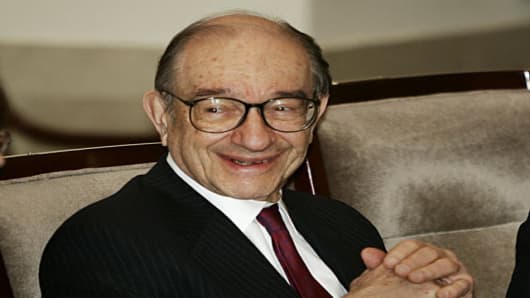ENGLEWOOD CLIFFS, N.J., September 17, 2007-CNBC, First in Business Worldwide, presents an extensive interview with former Federal Reserve Chairman Alan Greenspan-arguably the most important central banker of modern times. In excerpts of the interview with CNBC's Maria Bartiromo, which will air through the day on CNBC, Greenspan discusses the state of the world economy, whether interest rates were kept too low for too long, the state of the subprime, and presidential politics.
Below are excerpts of the interview, which will air all day on CNBC. The excerpts began airing on "Squawk Box" (6-9 AM ET) and will be aired on "Squawk on the Street" (9-11 AM), "The Call" (11-Noon), "Power Lunch" (Noon-2 PM), "Street Signs" (2-3 PM), "Closing Bell" (3-5 PM), "Kudlow & Company" (5-6 PM), "On the Money" (7-8 PM) and "Fast Money" (8-9 PM).
This will be followed by "Greenspan: Power, Money & The American Dream," tonight, September 17th at 9PM & 12AM ET. The program is reported by CNBC's Maria Bartiromo.
Below are the excerpts:
MARIA BARTIROMO:
Are-- are we going to see then a contagion (?) in Europe and Asia of what we're seeing here in the U.S.?
ALAN GREENSPAN:
In-- in what sense/
MARIA BARTIROMO:
Housing slow down?
ALAN GREENSPAN:
Well, okay.
MARIA BARTIROMO:
Bad loans with the financials holding the bag?
ALAN GREENSPAN
That's-- precisely the question that everyone's asking. We unlike the rest of the world-- are showing some now modest price decline. And my concern is that it can get-- can get quite a good deal larger. It's not showing up in the other parts. In other words, Britain has had a much bigger residential price boom than we. Australia has. Spain has. There are, in fact, 20 countries which the economists-- observes and monitors-- quarterly on house price changes, and the boom has been worldwide and phenomenal. The United States is actually somewhere below average. But it's only here where we're beginning now to see some price declines.
There's been some-- not-- some-- I shouldn't say that it's not been anywhere else. But the real concern is here. It's not been in Britain. It's not been Australia. In fact, prices went down, then they started back up. And everyone is wondering which is the right model? Is it-- or the one that is gonna prevail, whether it is ours? Or, is it gonna be that the result of these big-- bubbles in housing that prices go up, but instead of going down, they just flatten out.
MARIA BARTIROMO
It doesn't sound like you think there's gonna be a contagion.
ALAN GREENSPAN:
Well, the problem is, is that-- we haven't seen one yet. I don't know. But I will say it's the critical question.


